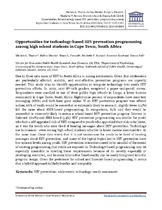Opportunities for technology-based HIV prevention programming among high school students in Cape Town, South Africa
Date
2014Author
Ybarra, Michele L.
Mwaba, Kelvin
Prescott, Tonya L.
Roman, Nicolette V.
Rooi, Bronwyn
Bull, Sheana
Metadata
Show full item recordAbstract
One in three new cases of HIV in South Africa is among adolescents. Given that adolescents are particularly affected, scalable, and cost-effective prevention programs are urgently needed. This study aims to identify opportunities to integrate technology into youth HIV prevention efforts. In 2012, 1107 8th-11th graders completed a paper-and-pencil survey. Respondents were enrolled in one of three public high schools in Langa, a lower income community in Cape Town, South Africa. Eighty-nine percent of respondents have used text messaging (SMS) and 86% have gone online. If an HIV prevention program was offered online, 66% of youth would be somewhat or extremely likely to access it; slightly fewer (55%) felt the same about SMS-based programming. In comparison, 85% said they would be somewhat or extremely likely to access a school-based HIV prevention program. Interest in Internet- (60%) and SMS-based (54%) HIV prevention programming was similar for youth who had a self-appraised risk of HIV compared to youth who appraised their risk to be lower, as it was for youth who were tired of hearing messages about HIV prevention. Technology use is common - even among high school students who live in lower income communities. At the same time, these data reveal that it is not uncommon for youth to be tired of hearing messages about HIV prevention, and many of the typical topics key to HIV prevention have low interest levels among youth. HIV prevention researchers need to be mindful of the extent of existing programming that youth are exposed to. Technology-based programming may be especially amenable to meeting these requirements because of its novelty especially in developing countries, and because interactive functionality can be easily integrated into the program design. Given the preference for school and Internet-based programming, it seems that a hybrid approach is likely feasible and acceptable.

